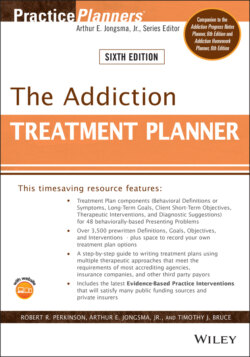Читать книгу The Addiction Treatment Planner - Группа авторов - Страница 15
REFERENCES
Оглавление1 American Psychiatric Association. (2013). Diagnostic and statistical manual of mental disorders (5). Author.
2 American Psychiatric Association. (2020) American Psychiatric Association practice guidelines. American Psychiatric Association [Online]. Available from http://psychiatryonline.org/guidelines.aspx.
3 American Psychological Association. (2020) APA clinical practice guidelines. American Psychological Association [Online]. Available from https://www.apa.org/about/offices/directorates/guidelines/clinical-practice.
4 American Psychological Association Division 12: Society of Clinical Psychology. (2016) American Psychological Association division 12 website on research-supported psychological treatments [Online]. Available from https://www.div12.org/treatments/.
5 American Psychological Association Presidential Task Force on Evidence-Based Practice. (2006). Evidence-based practice in psychology. American Psychologist, 61 (4), 271–185.
6 Bohart, A., & Tallman, K. (1999). How clients make therapy work: The process of active self-healing. American Psychological Association.
7 Cochrane Collaboration Reviews [Online]. Accessed on June 5, 2020. Available from http://www.cochrane.org.
8 David, D., Lynn, S. J., & Montgomery, G. H. (Eds.). (2018). Evidence-based psychotherapy: The state of the science and practice. Wiley.
9 Dimidjian, S. (Ed.) (2019). Evidence-based practice in action. Guilford Press.
10 Finley, J., & Lenz, B. (2014). Addiction treatment homework planner. Wiley.
11 Goldfried, M. R. (2019). Obtaining consensus in psychotherapy: What holds us back? American Psychologist, 74 (4), 484–496.
12 Hedegaard, H., Miniño, A. M., & Warner, M. (2020). Drug overdose deaths in the United States, 1999–2018. National Center for Health Statistics.
13 Institute of Medicine. (2001). Crossing the quality chasm: A new health system for the 21st century. National Academies Press Available from http://www.iom.edu/Reports.aspx?sort=alpha&page=15
14 Jongsma, A. E. (2005). Psychotherapy treatment plan writing. In G. P. Koocher, J. C. Norcross, & S. S. Hill (Eds.), Psychologists' desk reference (2, pp. 232–236). Oxford University Press.
15 Jongsma, A. E. & Bruce, T. J. (2014). Adult psychotherapy homework planner (5). Wiley.
16 Jongsma, A. E., & Bruce, T. J. (2010–2012). The evidence-based psychotherapy treatment planning DVD-based series. Wiley. Available from http://www.Wiley.com/go/ebtdvds
17 Jongsma, A., Peterson, M., McInnis, W. P., & Bruce, T. J. (2014). Adolescent psychotherapy homework planner. Wiley.
18 Kelly J. F., Humphreys, K., & Ferri, M. (2020). Alcoholics anonymous and other 12-step programs for alcohol use disorder. Cochrane Database of Systematic Reviews, 3, CD012880.
19 Kelly, J. F., Humphreys, K., & Yeterian, J. (2013). Mutual-help groups. In M. Herie & W.J.W. Skinner (Eds.), Fundamentals of addiction: A practical guide for counsellors (pp. 321–348). Centre on Addiction and Mental Health, 2013: 321–48.
20 Manning, V., Best, D., Faulkner, N., Titherington, E., Morinan, A., Keaney, F., et al. (2012). Does active referral by a doctor or 12-step peer improve 12-step meeting attendance? Results from a pilot randomised control trial. Drug and Alcohol Dependence, 126, 131–137.
21 Nathan, P. E., & Gorman, J. M. (Eds.). (2015). A guide to treatments that work (4). Oxford University Press
22 New Freedom Commission on Mental Health. (2003). Achieving the promise: Transforming mental health care in America (Final report. DHHS Publication No. SMA-03-3832). Rockville, MD: Author. Available from http://govinfo.library.unt.edu/mentalhealthcommission/reports/reports.htm
23 National Institute on Drug Abuse [Online]. Accessed on June 5, 2020. Available from https://www.drugabuse.gov
24 National Institute for Health and Clinical Excellence (NICE) (2020) [Online]. Available from www.nice.org.uk.
25 Norcross, J. C. (Ed.). (2002). Psychotherapy relationships that work: Therapist contributions and responsiveness to patient needs. New York, NY: Oxford University Press.
26 Norcross, J. C. (Ed.). (2019). Psychotherapy relationships that work (3). Oxford University Press.
27 Norcross, J., Campbell, L., Grohol, J., Santrock, J., Selegea, F., & Sommer, R. (2013). Self-help that works: Resources to improve emotional health and strengthen relationships. Oxford University Press.
28 Norcross, J. C., Hogan, T. P., & Koocher, G. P., & Maggio, L. A. (2017). Clinician's guide to evidence-based practices: Behavioral health and the addictions. Oxford University Press
29 Norcross, J. C. & Lambert, M. J. (2018). Psychotherapy relationships that work III. Psychotherapy, 55 (4), 303–315. 10.1037/pst0000193
30 Norcross, J. C. & Wampold, B. E. (eds.) (2018). Psychotherapy relationships that work III. Psychotherapy, 55 (4), 303–315. 10.1037/pst0000193
31 Substance Abuse and Mental Health Services Administration's (SAMHSA) National Mental Health Information Center: Center for Mental Health Services (2004). National consensus statement on mental health recovery. Author Available from http://www.westga.edu/∼vickir/MentalHealth/MH01%20Intro-duction/10%20Fundamental%20Components.pdf
32 Timko, C., Debenedetti, A., & Billow, R. (2006). Intensive referral to 12step self-help groups and 6-month substance use disorder outcomes. Addiction, 101 (5), 678–688.
33 Walitzer, K. S., Dermen, K. H., & Barrick, C. (2009). Facilitating involvement in alcoholics anonymous during out-patient treatment: A randomized clinical trial. Addiction, 104 (3), 391–401.
34 Wampold, B. E. (2001). The great psychotherapy debate: Models, methods, and findings. Erlbaum.
35 Wilson, N., Kariisa, M., & Seth, P., Smith, H., & Davis, N. L. (2020). Drug and opioid-involved overdose deaths—United States, 2017-2018. Morbidity and Mortality Weekly Review, 69, 290–297.
